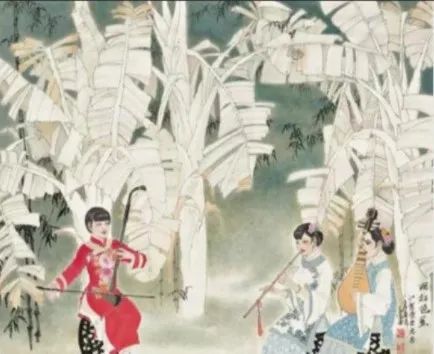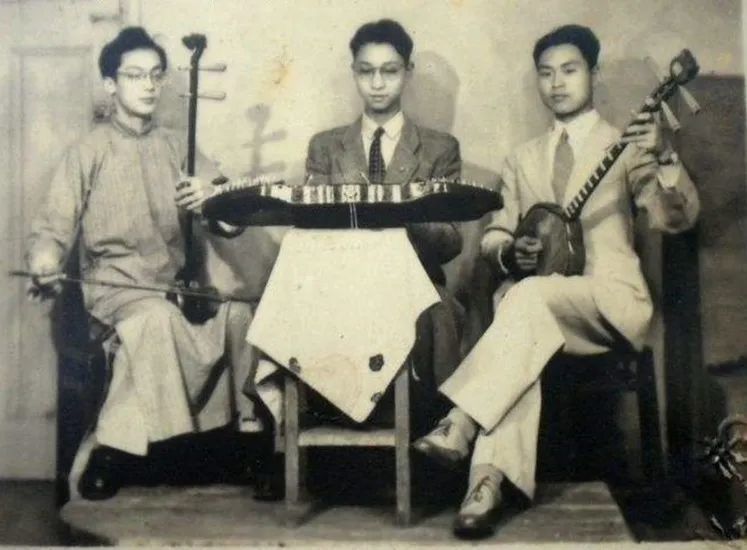Happy combination, happy music - Cantonese fun combination
People who don't know the "Cantonese Fun Group" may wonder why these young girls love to play traditional musical instruments.
But if you have watched their live performances, you will know that when they are playing, there is always a tacit pleasure flowing on the stage between the five people's eyebrows and eyes, and it has always flowed into the hearts of the audience.
They said that when the five of them played together, there was only one voice, and everyone became one.
This is the charm of the combination. When everyone's eyes rise and fall with the music at the same time, the brilliance of their intertwined eyes suddenly shines, which can instantly produce a shocking resonance.

Cantonese fun combination
happy mix, happy music
Cantonese music, also known as Cantonese music, is a form of instrumental music performed independently. From the 1920s to the 1930s, it once led the development trend of domestic instrumental music.
From the early 1920s to the early days of the founding of the People's Republic of China, as many as 300 pieces of Cantonese music were created, which are still circulating at home and abroad. There is a saying that "where there is an overseas Chinese office, there is a music friend in Guangdong".
So far, it has evolved into a performance form based on five heads (that is, an ensemble of five musical instruments). Most of his works are based on the praise of nature, such as the well-known "Rain on Bananas", "Pinghu Autumn Moon", etc. The style is lively and the rhythm is lively, showing the charm of Cantonese music.

"Cantonese Fun Group" is a band composed of five girls who love Cantonese music, all of them are from Xinghai Conservatory of Music. They said that the original intention of the group was to enjoy music and have fun. Because Yue and Cantonese are homophonic, they named the band "Cantonese Fun".
When they are offstage, they can't always be quiet, they like to laugh and play, they are very lively. Coincidentally, we invited them to "Yue Jian TA Talk", which coincided with the tenth anniversary of their group's establishment. They laughed and said that they came to participate in this recording of my humble opinion, even if it was a tenth anniversary celebration.
During the conversation with Humble Opinion, they have been humbly emphasizing that they are just a performer, not a performer. Although they are usually hilarious and hilarious, they treat music with a pious awe.
Academic VS Folk Enthusiasts
For the members of the Cantonese Fun Group, they are all from academies, have received systematic music education, and are also professional in music, but they do not think that they are more professional than amateurs, but have a sense of their identity as professional musicians. be vigilant.
Chen Meili, a member of Cantonese Fun Group, said: "In addition to focusing on skills, we should pay more attention to the expression of emotions, which is the charm of music. But many times we take it too seriously, especially when participating in some commercial activities. I will choose those repertoires that can show technical ability and can be very brilliant to practice, sometimes too much emphasis on technical things, but losing the feeling of enjoying music, this is a problem we should pay attention to.”
Indeed, many folk music lovers have no utilitarian purpose for music, but simply enjoy the fun and beauty that music brings to them, which may be the original intention that professional musicians are prone to lose.
Perhaps because of this, the Cantonese Fun Group is very willing to participate in the activities of some folk music clubs, play and communicate with different people, and make progress together.

Private Partnership
There is a word in Cantonese called "private partner bureau", which probably means a private music party held by several people with musical instruments. They travel through the urban and rural areas of Baiyun, and occasionally hear the curling sounds of Cantonese music and Cantonese opera. This is unique. The elegant life of Lingnan people.
Unofficial Heir, Plant a Seed
Members of the Cantonese Fun Group will participate in some Cantonese music teaching activities, regardless of the elderly and children.
They joked that they were the unofficial inheritors of Cantonese music: "We teach some children to learn some traditional songs, just like planting a seed, maybe at some point in the future they will take root and sprout, adding to the tree of Cantonese music. Branches and leaves."
If you suddenly hear a song you listened to when you were a child, your memories are flooded with familiar melody, and you can't help exclaiming: "This song, I've heard it before." opportunity.
 渝公网安备 50010702504639号
渝公网安备 50010702504639号